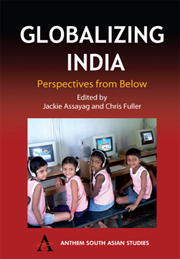Book contents
- Frontmatter
- Contents
- List of Contributors
- Acknowledgements
- 1 Introduction
- Part One Economy and Agriculture
- Part Two Education and Language
- 6 ‘Children are Capital, Grandchildren are Interest’: Changing Educational Strategies and Parenting in Calcutta's Middle-class Families
- 7 Of Languages, Passions and Interests: Education, Regionalism and Globalization in Maharashtra, 1800–2000
- Part Three Culture and Religion
- Bibliography
7 - Of Languages, Passions and Interests: Education, Regionalism and Globalization in Maharashtra, 1800–2000
from Part Two - Education and Language
Published online by Cambridge University Press: 05 March 2012
- Frontmatter
- Contents
- List of Contributors
- Acknowledgements
- 1 Introduction
- Part One Economy and Agriculture
- Part Two Education and Language
- 6 ‘Children are Capital, Grandchildren are Interest’: Changing Educational Strategies and Parenting in Calcutta's Middle-class Families
- 7 Of Languages, Passions and Interests: Education, Regionalism and Globalization in Maharashtra, 1800–2000
- Part Three Culture and Religion
- Bibliography
Summary
The passions are not to be counted out in situations where interestmotivated behaviour is considered to be the rule.
Cardinal de Retz (Hirschman 1977: 135)March 2000, Kolhapur, Maharashtra, western India. It is noon on Saturday and the school day has just ended at the Vidyapeeth Marathi Shakha primary school, one of the oldest and most reputable Marathi-medium institutions in this southern town. We are in the teachers' room. The new Congress government in the regional state has just announced its decision to introduce compulsory English from Class I onwards. Ms Kalloli, the school principal, who has always publicly expressed her pride in her ‘Indian culture’ (Bhartiya sanskruti), is strongly opposed to such a measure. She is vehemently discussing the government's intention with her staff. I have known Kalloli Bai well for over two years. She is a strong-willed lady in her early fifties and is often rather outspoken. Yet never have I seen her behave so passionately. Her face is red with anger, her hair flying loose as she gestures forcefully in the course of her diatribe vituperating against what she sees as the new government's ‘populist policy’.
A few days later, when we meet again, Kalloli Bai takes up the topic afresh on her own initiative. Although she has cooled down by now, she makes no secret of how dear to her heart the issue of language is, shaking her head in negation: ‘No, it is definitely not good. It should not be done.’
- Type
- Chapter
- Information
- Globalizing IndiaPerspectives from Below, pp. 141 - 162Publisher: Anthem PressPrint publication year: 2005
- 7
- Cited by



